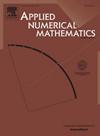低存储指数拟合显式龙格-库塔方法
IF 2.4
2区 数学
Q1 MATHEMATICS, APPLIED
引用次数: 0
摘要
本文研究了求解具有振荡或周期解的高维常微分方程系统的显式龙格-库塔(RK)方法,这种方法可以用少量内存寄存器实现。我们将这些方案称为低存储指数拟合显式龙格-库塔方法(LSEFRK)。为了获得它们,我们首先研究了二阶和三阶低存储(LS)方案,这些方案可以用van der Houwen和williamson型的每步两个存储寄存器来实现。接下来,我们通过施加指数拟合条件以及精度和稳定性来构造最优LSEFRK方法。在此基础上,针对每种LS方法构造了新的最优三阶和五阶LSEFRK方案。通过求解一些具有周期解的高维微分系统,验证了这些新格式的性能。与文献中其他非LS指数拟合和低存储非EFRK方法的比较表明,新的LSEFRK方案优于仅满足LS或EF条件的RK方法的效率。本文章由计算机程序翻译,如有差异,请以英文原文为准。
Low-storage exponentially fitted explicit Runge-Kutta methods
In this paper, we study explicit Runge-Kutta (RK) methods for solving high-dimensional systems of ordinary differential equations (ODEs), with oscillatory or periodic solutions, that can be implemented with a few memory registers. We will refer to these schemes as Low-Storage Exponentially Fitted explicit Runge-Kutta methods (LSEFRK).
In order to obtain them, we first study second-order and third-order low-storage (LS) schemes that can be implemented with two memory registers per step of the van der Houwen- and Williamson-type. Next, we construct optimal LSEFRK methods by imposing exponential fitting conditions along with accuracy and stability properties. In this way, new optimal three-stage third-order and five-stage fourth-order LSEFRK schemes are constructed for each type of LS method.
The performance of these new schemes is tested by solving some high-dimensional differential systems with periodic solutions. Comparison with other non-LS exponentially fitted and low-storage non-EF RK methods from the literature shows that the new LSEFRK schemes outperform the efficiency of RK methods that only satisfy either the LS or the EF condition.
求助全文
通过发布文献求助,成功后即可免费获取论文全文。
去求助
来源期刊

Applied Numerical Mathematics
数学-应用数学
CiteScore
5.60
自引率
7.10%
发文量
225
审稿时长
7.2 months
期刊介绍:
The purpose of the journal is to provide a forum for the publication of high quality research and tutorial papers in computational mathematics. In addition to the traditional issues and problems in numerical analysis, the journal also publishes papers describing relevant applications in such fields as physics, fluid dynamics, engineering and other branches of applied science with a computational mathematics component. The journal strives to be flexible in the type of papers it publishes and their format. Equally desirable are:
(i) Full papers, which should be complete and relatively self-contained original contributions with an introduction that can be understood by the broad computational mathematics community. Both rigorous and heuristic styles are acceptable. Of particular interest are papers about new areas of research, in which other than strictly mathematical arguments may be important in establishing a basis for further developments.
(ii) Tutorial review papers, covering some of the important issues in Numerical Mathematics, Scientific Computing and their Applications. The journal will occasionally publish contributions which are larger than the usual format for regular papers.
(iii) Short notes, which present specific new results and techniques in a brief communication.
 求助内容:
求助内容: 应助结果提醒方式:
应助结果提醒方式:


